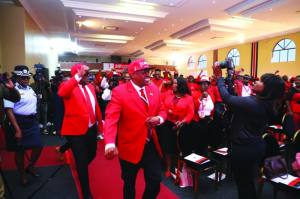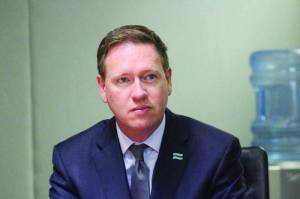The Botswana 2023–2024 financial year Budget was presented in a challenging global operating environment due to the conflict between Russia and Ukraine. This has led to a slowdown in global growth and is expected to affect the Sub-Saharan African region.
Despite this, the Botswana economy has shown strong resilience and grew by 11.8% in 2021, the fastest growth rate in sub-Saharan Africa. The growth is expected to continue in 2022, with the economy estimated to grow by 6.7 percent once Statistics Botswana has validated it on their end.
In 2023 and 2024, growth is projected atfour percent and 5.1 percent respectively, due to better-than-expected performance of the mining and non-mining sectors. However, there are macro-fiscal risks such as slowing growth and a possible recession in advanced countries, which may affect diamond sales, rising COVID-19 infections in China, and global inflation risks.
The revenue structure is susceptible to external shocks and high volatility and uncertainty, which could compromise fiscal consolidation and result in elevated debt risks approaching the 40% of GDP threshold prescribed by the Bank of Botswana.
The proposed budget indicates a need for a more sustainable and long-term approach to improving the country's financial status. Even though it has been stressed many times that we need to diversify from being a mineral-led economy and invest in other sectors such as tourism, manufacturing, agriculture and the like, it has become a monotonous song that we sing to keep the public calm.
The truth of the matter is that whilst we allocate funds through the state-owned entities to develop some of these service sectors, there is little to no evaluation as to their return on investment, the number of jobs they create, the value addition they bring forward in developing communities thereby addressing some of the socioeconomic challenges facing many Batswana today.
The Public Accounts Committee has been rather relaxed in the monitoring and evaluation of the same initiatives set out by the government to ensure prudence towards the Reset Agenda, the two-year Transitional National Development Plan and Vision 2036 along with the economic policies that guide these.
In evaluating the key budget priorities, just as last year, the Education, Health and Defence ministries have the largest allocations which bring in a certain level of scepticism. We may isolate these and discuss these a bit.
Whilst it is key to invest in a knowledge-based economy, it is very sad to see the quality of our education system declining so drastically. Writing this as a product of the government education system, one can tell how the discipline and desire to persevere in moving our livelihoods out of poverty, does not exist anymore. “Who is to blame?” is the big question, yet no one is being called to account for pass marks across streams.
Health too has seemed to cause such havoc in the public eye with the issues of shortfalls in medicinal supplies causing an outcry in most rural areas as well as speculation of corruption within the sector. We have not seemed to fully utilise the resources that the government has already invested including in facilities such as the Sir Ketumile Masire Memorial Hospital as well as the skilled personnel of doctors that have been trained through mostly the Top Achievers Scholarship at the taxpayers' expense. It is saddening that the very same tax payer gets to suffer due to lack of government service delivery.
Defence as well has caused such an outcry in consecutive years' budget allocations which have not brought forward just cause towards the need versus the opportunity cost of other sectors within the country, rather than being a recurring line item on the gross budget.
We may also need to scrutinise the current budget deficit which stands at seven billion, five hundred and ninety million Pula (P7.59 billion), or 3.06 percent of GDP. Whilst we are happy that the prior year's forecast budget deficit did not materialise due to less spending and a surplus on the balance of payments, we also need to be mindful that this potentially means projects and developments that were intended to have been executed in that financial year have not materialised and service delivery to the people, as a consequence, has not been fulfilled as anticipated.
In any case, the government is currently sitting at debt levels of 25% of GDP and continues to fund the budget deficit through the issuance of debt securities and feeding from the Government Investment Account, which too has improved but we still feed off of it. The rising level of debt, as we discussed in our previous article, may cause some bit of concern as it comes too close to the 40% threshold, but also may dilute competitiveness in the capital market as we preach the need for the private sector to take lead in the market.
However, the author would like to commend the government on the new statutory instrument to redirect the share of pension funds allocated onshore and increase competitiveness for our local market.
These are some of the issues we discussed previously that Botswana needs to take advantage of the AfCFTA and other trade agreements by enhancing its capital market and its related Pan African Network.
In contrast, however, areas that I feel have not been addressed in developing the nation that we envision, are the issues of corruption and the inequality gap that forever hound our great nation. Often times, we turn a blind eye towards some anomalies within the government service and lack of adequate service delivery to the people.
This, just like a stack of cards, has a ripple effect on the general public, such as addressing several socioeconomic issues. Unemployment was softly addressed, but in as much as we acknowledge some of the interventions that the government has set forth, we need to strengthen policies and the business environment so that it is suitable for SME development, and in particular, adapt it to today’s economic environment.
In reflection, Botswana should harness its friendly relations within the region and the rest of the world. It should understand its core strengths and essential markets for key products, not just diamonds, but even beef and non-mineral related products. In addition, the country needs to accelerate development of the necessary infrastructures of road networks, telecommunications and essentials like water and electricity. It is sad, to say the very least, that households still suffer from a lack of these.
The import bill stands so high, yet an opportunity exists to invite foreign direct investment as Botswana has the resources, the skilled personnel and staff, and business incentives to promote growth here. That is where the focus should be. This would allow all other related ministries, systems, and government administrations to feed off one another within that ecosystem and this is something the former minister as well alluded to ensure self-sustainability.
*Chilo Ketlhoafetse is a Chartered Accountant and Media Finance Specialist focusing on economic issues affecting the local business environment. Commentary and interactions can be sent to [email protected] and Twitter @chilo_ket.







